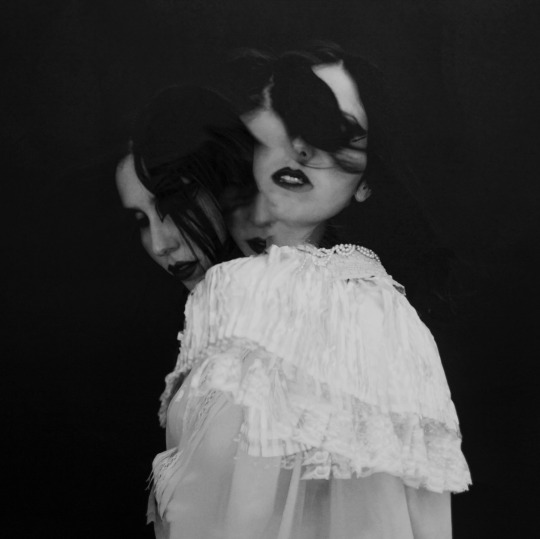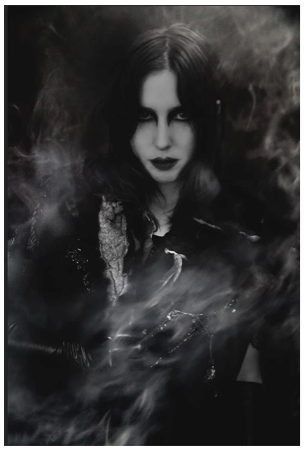

The lo-fi fuzz and red raw minimalism of Chelsea Wolfe’s 2010 debut outing The Grime and the Glow feel like a distant memory when listened to alongside Abyss. Her fifth and most tonally diverse offering to date, it serves as a fitting reminder of the sonic distance she’s covered over her deceptively short career, which, lest we forget, spans a mere five years. That’s five albums in five years; a prolific output in anyone’s book.
Perhaps this quick-fire approach can explain how she’s been able to arrive at her current destination in such an impressive time frame. These days, most artists struggle to put out a record once every two or three years; years spent ruminating on and refining material to the point that audible progress gets lost in the search for polished perfection. Yet, where others endeavour to cloak or eradicate the perceived blemishes and imperfections of their art with extensive recording and production sessions, Wolfe, it seems, is more concerned with capturing the emotion and intensity of the moment.
That said, the signature moves that make Wolfe and her work so unique are evident as ever throughout Abyss, blending all of the touchstones from each of her previous efforts and coaxing them into previously uncharted territories.
The result is a record that showcases Wolfe at her gothic, folk-infused best. Seamlessly woven between dense layers of crashing guitar and industrial electronica lie brittle vocals and disarmingly infectious melodies, shedding just enough light to offset the weight of the darkness.
How, then, did she and the band arrive at this new, all-encompassing sound?
“We are a band that is constantly striving to grow and try new things, but the way our sound has developed has been really natural and instinctual,” Wolfe explains. “I’m really lucky to play with such great musicians and working with my co-producer, Ben Chisholm, has taken this project in such a cool direction - we’ve been able to combine our inspirations to create something new.”
A different approach to recording also helped shape the sound of Abyss, with both a change of scenery and a closer working relationship with the album’s producer contributing to its more eclectic sound.
“I was more open to working with a producer on this album - wanted some fresh blood in the mix. We’ve always recorded in California, but this time we went out to Dallas for a month to record at John Congleton’s studio with him. Working with a producer automatically introduces a new element and even some tension to the recording. We always demo out all of our songs before we head into the studio, so sometimes it’s hard not to get attached to all the elements and layers there. In the studio it becomes a balancing out of things - the parts we initially came up with and new parts that are written in the studio.”
When it came recording the new material, Wolfe capitalised on an abundance of vintage equipment found in Congleton’s studio to achieve the tonal qualities she had been seeking.
“John’s studio is full of rad, old gear. We used little amps - a Matchless and an old Fender Princeton. We used a MiniMoog Model D for a lot of the bass synth, which made it super heavy.
“Most of the guitar was done on my Gibson ES 335, which I got last year, and Mike Sullivan played his parts on his beautiful Gibson Lucille. We also used a Fender Jazzmaster. We used a Therevox ET 4.2 on ‘Dragged Out’. It sounds terrifying to me, like hearing an air-raid siren but not so literal.”
So, how has her personal set-up changed over the years? Is she content with the arsenal currently at her disposal, or does she see herself as a collector of gear?
“I used to focus more on vocal effects pedals - running my M80 mic through guitar pedals and Boss loop station and my second mic (Beta 58) through a TC Helicon vocal pedal, but in recent times I’ve also gotten more and more into guitar pedals. I used to rely on the natural distortion of my amp (Fender Hot Rod Deluxe), but yeah, now I’m collecting tone and distortion pedals and it’s so much fun. I’m also playing through a Death by Audio Apocalypse, EarthQuaker Talons, POG and more. I’m also into Dwarfcraft pedals.“

And what of the effects deployed on Abyss? In recent years, artists have been increasingly relying upon iPhone and iPad FX apps during the recording process. Is this an approach Wolfe has embraced?
“Almost none of the effects on the album were produced in a computer or app, the exception being some digital reverbs here and there, but rarely. We used a range of guitar pedals and ran almost everything through them. A lot of EarthQuaker pedals, like Disaster Transport and Afterneath. We used MemoryMan 2s and Eventide pedals.
“Ben uses Ableton to create the vocal cut-up work, but even a lot of that was re-amped. I wanted the album to be raw and natural, and John pushed it even further in that direction.”
Wolfe’s traditional approach to recording is mirrored somewhat in her musical buying habits; opting, where possible, to purchase instruments from bricks and mortar stores, as opposed to online retailers.
“If I find a used instruments store or mom and pop-style music store I’m much more apt to go to that, but I also tend to hit the Guitar Center often for stuff too. I bought my newest guitar (the Gibson) from Ebay because I was looking for a really specific one - I had played one in a guitar shop at some point and fell in love, but I needed to save up for it. But I do prefer to just connect with an instrument in person, like I did with my Fender Jaguar. I’ve always loved Jaguars and Jazzmasters and when I saw that one sitting there, all natural matte wood with no pick guard, I knew it was true love, and I played that on the road for two or three years.
This emotional and physical response to music stems back to Wolfe’s formative years as a young child, citing access to musical instruments and music stores from a young age as crucial aspects in her development as a musician.
“I found my mom’s old classical guitar that she played in high school in the garage at some point and it became my favorite guitar to write on. One of the tuning pegs had broken off so I just tuned to that string. It was quite a bit lower because of that so from then on I tuned all of my guitars down to it, to D standard. It suits me better. My dad also passed down an acoustic Guild to me that I cherish and still write a lot on, and a lot of other gear. There were some used instrument stores in my hometown of Sacramento that I used to love to wander through, but they’ve sadly all closed.”
Wolfe is also of the opinion that a lack of independent music stores could have a significant impact upon the way future generations engage with music
“It might affect the way people connect to instruments or learn about them, maybe. You don’t meet very many sales people in large chain stores who really LOVE guitars and love talking about them, their history. I think that’s the thing we’ll lose out on. It’s a shame but it’s true of many types of businesses these days - bookstores, record shops etc.”
Released August 7th, Abyss could be seen as a fitting bookend to Wolfe’s output to date. It certainly feels like a definitive piece of work, encapsulating each of the key strokes that make up her signature. Either way, we probably won’t be made to wait too long to see where record number six takes her.